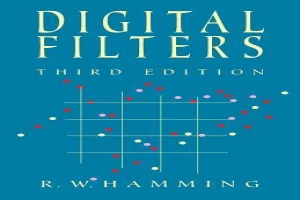Newly released
This book is new and will be uploaded as soon as it becomes available to us and if we secure the necessary publishing rights.

Digital filters Book PDF
(0)
Author:
Richard W. HammingNumber Of Reads:
266
Language:
English
Category:
Natural ScienceSection:
Pages:
373
Quality:
good
Views:
2081
Quate
Review
Save
Share
New
Book Description
This introductory text examines digital filtering — the processes of refining signals— and its relevance to many applications, particularly computer-related functions. Assuming only a knowledge of calculus and some statistics, it concentrates on linear signal processing, with some consideration of roundoff effects and Kalman filters. Numerous examples and exercises.
Richard W. Hamming
Richard Wesley Hamming was an American mathematician, whose work had many implications for computer and communications engineering. Some of his contributions are: Hamming's code (or symbol) (which uses the Hamming matrix), the Hamming window, Hamming numbers, fill-sphere problems (or Hamming field), and Hamming distance.
Hamming was born in Chicago on February 11, 1915, and attended the University of Chicago, the University of Nebraska, and the University of Illinois at Urbana-Champaign, where he wrote his doctoral thesis under the supervision of Vladimir Tregetzinsky (1901-1973). In April 1945 he joined the Manhattan Project at Los Alamos Laboratory, where he programmed IBM's mechanical calculators that calculated solving equations provided by project physicists. He left the project to join Bell Telephone Laboratories in 1946. Over the next fifteen years he was involved in nearly all of the laboratories' notable achievements.
After retiring from Bell Laboratories in 1976, Hamming took a position at the Naval Postgraduate School in Monterey, California, working there as an assistant professor and senior lecturer in computer science, devoting himself to teaching and writing books. He gave his last lecture in December 1997, a few weeks before he died of a heart attack on January 7, 1998.
Read More
Book Currently Unavailable
This book is currently unavailable for publication. We obtained it under a Creative Commons license, but the author or publisher has not granted permission to publish it.
Rate Now
5 Stars
4 Stars
3 Stars
2 Stars
1 Stars
Digital filters Quotes
Top Rated
Latest
Quate
Be the first to leave a quote and earn 10 points
instead of 3
Comments
Be the first to leave a comment and earn 5 points
instead of 3